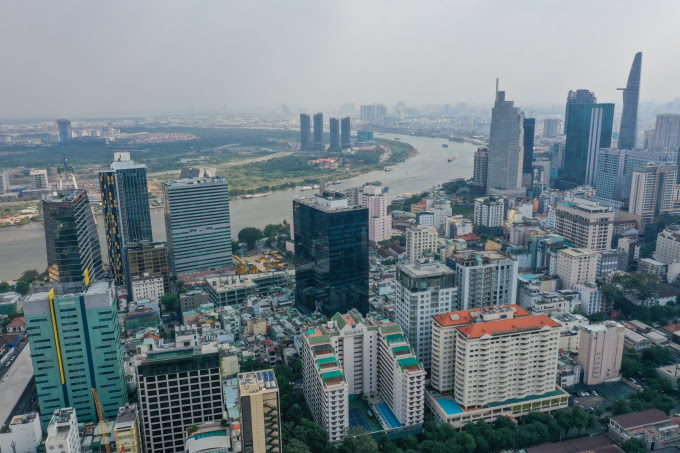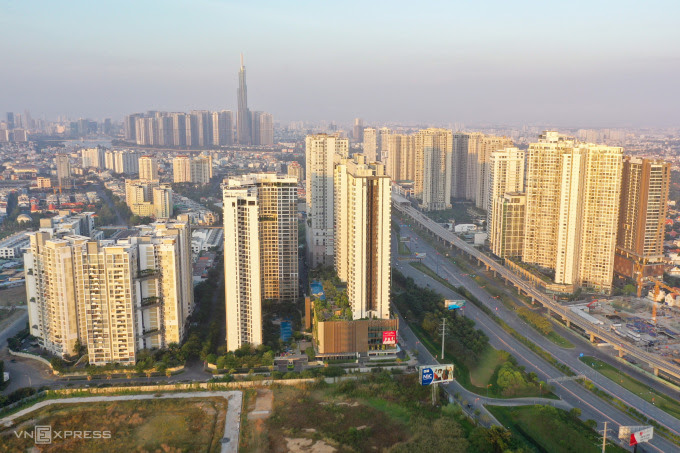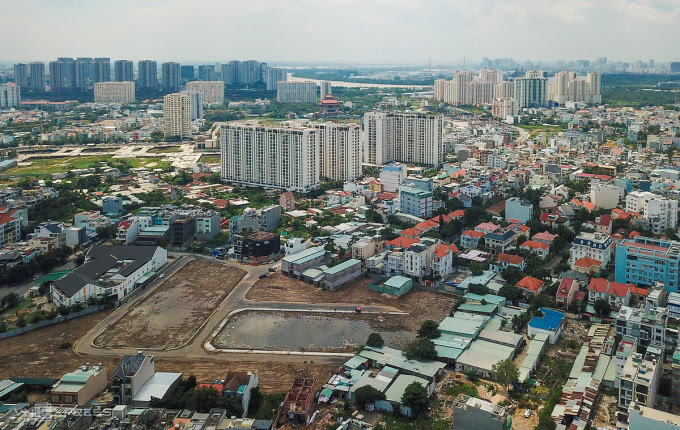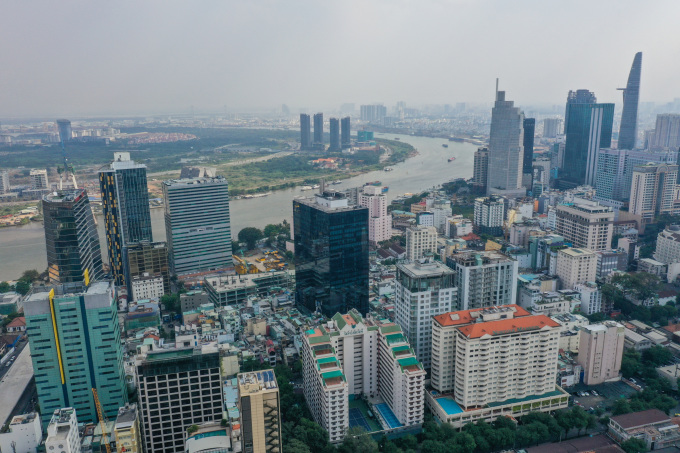Property Taxation, When Will It Change?
In recent days, many press and forums have discussed changes in real estate taxing, in which, some people urged and some struggled.
Experts say it’s time to levy property tax, but also have a cautious view because it can have a negative impact on the real estate market and the economy.
Currently, the Ministry of Finance is only consulting on real estate tax collection policies, including taxation of houses and properties, include: proposing to combine the Law on agricultural land use tax and on non-agricultural land use tax, supplementing taxes on houses, studying and developing a law on property or real estate tax (if any).
One of the amendments (if any) mentioned by the Ministry of Finance is the amendment of the Law on agricultural land use tax and non-agricultural land use tax, as well as the addition of new contents that need to be regulated.

Real estate market in the central area of District 1, Ho Chi Minh City. Photo: Quynh Tran
According to experts, imposition of a property tax will be an effective tool to limit real estate speculation, but requires accurate market data. This is a tax that is levied directly on real estate owners, not real estate transfer tax, so it will limit speculation in this market; and concerns about increasing property prices when adding this tax are unlikely.

Real estate in the East of Ho Chi Minh City in February 2022. Photo: Quynh Tran
On the other hand, according to Resource Management expert, Dr. Dang Hung Vo, said this is a very appropriate time to propose a property tax, in the context that the total tax revenue related to real estate in Vietnam is still too low. But this is a very complex tax that needs to be studied carefully.
Total revenue from non-agricultural land use tax not yet taxed on housing is only 0.034% of GDP, while Indonesia’s 0.42%, Thailand’s 0.25% and the Philippines’ 0.84% (the middle group of average countries in ASEAN). Looking around the world, real estate taxes of the G7 group all reach 1% to 4% of GDP.
Vietnam’s total land revenue reached 29% of the total local budget revenue and 3.4% of GDP, equal to that of countries with an average level of development. The G7 countries in the first group, achieved a fairly high rate of revenue, generating 40% (Germany) to 90% (UK) of total local budget revenue and 1% to 4% of GDP.
Total revenue from Vietnam’s land is good, but mainly from land use levy – when the State allocates residential land and land rent or leases land for production and business. According to the Ministry of Finance, of the total revenue from land, 85% is from land allocation and land lease.
It is land allocation or land lease, but actually it is the recovery of agricultural land to allocate or lease non-agricultural land; can be visualized as an administrative decision allowing the change of land use purpose, which can make a lot of money without being related to any production or business activities. Such a way of collecting is not sustainable, especially when Vietnam is in the stage of complete industrialization and urbanization.
The focus on revenue from land use fees and land rents creates land speculation, bubbles, rocketing prices and inflation.
On the other hand, this is also the cause of social instability, which is related to the State mechanism to recover land without worrying about new livelihoods for farmers.
Therefore, it is necessary to tax real estate with the goal of creating a stable and long-term source of income, instead of collecting mainly from land allocation and land lease at present.
“However, this is a very complicated tax that needs to be studied carefully. If the law is made unreasonable, it will not achieve the above objectives, solve the market’s problems, or even prevent it from stopping land speculation.”

Townhouses and land plots in District 2, Ho Chi Minh City. Photo: Quynh Tran
To be more clear, can we look at the current land rush, is it due to low taxes or something else?
The property tax has been low for a long time. It has been proposed to amend four or five times, but it has not been successful.
Looking at the market in 2020, we can see four reasons that cause land fever is present.
Firstly, this is the first year of the planning period, many ideas are proposed for new elements in the next planning period. The new idea is proposed, but rumors spread fast, the land in the new planning place starts increasing.
Secondly, during the Covid period, income is no longer the same, making many people have to find other investment places to make profits. Investing in the real estate market is still considered the most familiar place.
Third, quite a lot of real estate projects are waiting for approval but cannot because it is not against one law or another. The National Assembly and the Government have actively revised the Law on Investment, the Law on Construction… but the two basic laws, the Land Law and the Urban Planning Law, remain dormant. The legal bottleneck is still there. The demand is high but the supply is short, so the price increase is inevitable.
Of course, the fourth is the role of “price stimulant” of the “speculative parties” to make profit.
Thus, in the current period, the real estate price fever is caused by market circumstances, especially the lack of supply due to the unreasonable legal system.
Thus, taxing houses and properties will not necessarily solve the problem of cooling down the current land fever.
Another thing worth pondering concerns the tax administration system. Switching from a manual collection system to a correct, adequate and reasonable collection system in the 4.0 era is a big problem.
The real estate management system must be open, transparent, and detect all cases in the name of properties.
This is not only a big problem in collecting property taxes, but also to detect cases where Vietnamese people act on behalf of foreigners, related to national security, which has been the focus of many discussions on the previous public opinion.
Therefore, the Civil Code must also be revised to accept the mechanism for explaining the origin of assets and the accompanying sanctions.
In short, this tax is related to a lot of complex issues, requiring the removal of legal bottlenecks; switch from manual collection system to digital administration-based collection system; real estate management system must be governance based on transparency, participation of the people and accountability of the management agency…
Real estate tax reform is really necessary, but it also needs thorough preparation in a comprehensive direction to be highly effective.
Realtique Co., LTD
+84866810689 (Whatsapp/Viber/Zalo/Wechat)








